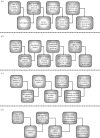Cooking up the perfect insect: Aristotle's transformational idea about the complete metamorphosis of insects
- PMID: 31438815
- PMCID: PMC6711290
- DOI: 10.1098/rstb.2019.0074
Cooking up the perfect insect: Aristotle's transformational idea about the complete metamorphosis of insects
Abstract
Aristotle made important contributions to the study of developmental biology, including the complete metamorphosis of insects. One concept in particular, that of the perfect or complete state, underlies Aristotle's ideas about metamorphosis, the necessity of fertilization for embryonic development, and whether morphogenesis involves an autonomous process of self-assembly. Importantly, the philosopher erroneously views metamorphosis as a necessary developmental response to lack of previous fertilization of the female parent, a view that is intimately connected with his readiness to accept the idea of the spontaneous generation of life. Aristotle's work underpins that of the major seventeenth century students of metamorphosis, Harvey, Redi, Malpighi and Swammerdam, all of whom make frequent reference to Aristotle in their writings. Although both Aristotle and Harvey are often credited with inspiring the later prolonged debate between proponents of epigenesis and preformation, neither actually held firm views on the subject. Aristotle's idea of the perfect stage also underlies his proposal that the eggs of holometabolous insects hatch 'before their time', an idea that is the direct precursor of the much later proposals by Lubbock and Berlese that the larval stages of holometabolous insects are due to the 'premature hatching' from the egg of an imperfect embryonic stage. This article is part of the theme issue 'The evolution of complete metamorphosis'.
Keywords: Aristotle; William Harvey; epigenesis; fertilization; spontaneous generation.
Conflict of interest statement
I declare I have no competing interests.
Figures

References
-
- Thompson DW. 1913. On Aristotle as a biologist with a prooemion on Herbert Spencer; being the Herbert Spencer lecture delivered before the University of Oxford, on February 14, 1913. Oxford, UK: Clarendon Press.
-
- Leroi AM. 2014. The lagoon: how Aristotle invented science. London, UK: Bloomsbury Circus.
-
- Lennox J. 2019. Aristotle's biology. In The Stanford encyclopedia of philosophy (ed. EN Zalta), winter 2016 edn. See https://plato.stanford.edu/archives/spr2019/entries/aristotle-biology/ (accessed 3 July 2019).
-
- Aristotle. 1942. Generation of animals. (Transl. by AL Peck. Loeb Classical Library) Cambridge, MA: Harvard University Press.
-
- Aristotle. 1970. History of animals, books IV–VI. (Transl. by AL Peck. Loeb Classical Library) Cambridge, MA: Harvard University Press.
Publication types
MeSH terms
Personal name as subject
- Actions
LinkOut - more resources
Full Text Sources

